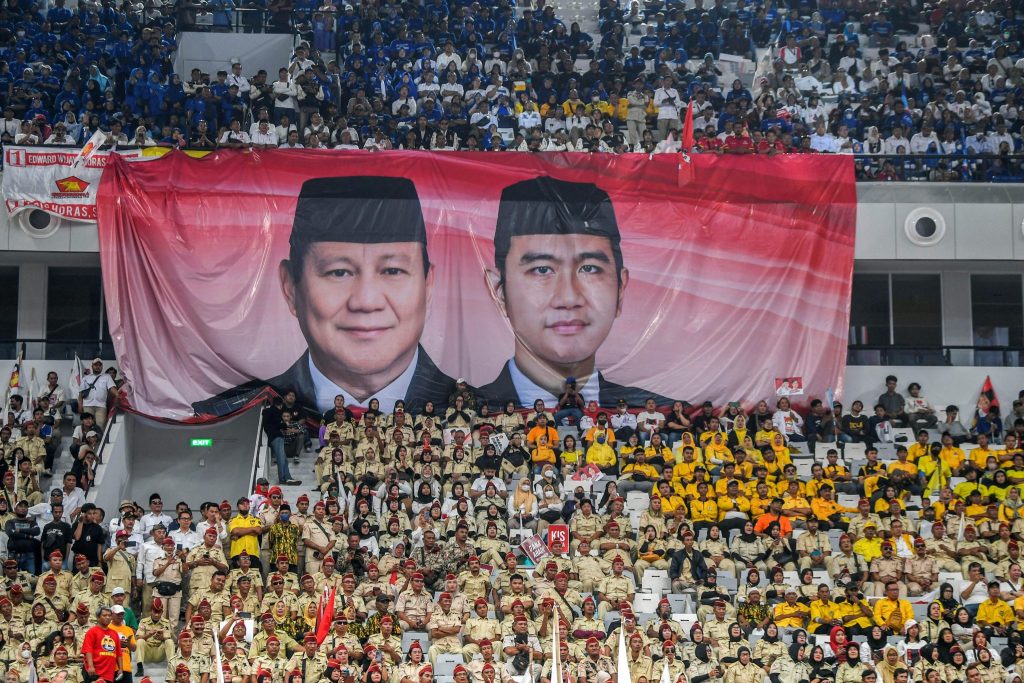About ten weeks out from the first round of Indonesia’s presidential elections, Prabowo Subianto is on a roll.
He can credit two things for his dominance in the polls ahead of the first round of voting, scheduled for 14 February. First is the refresh of his political persona since his co-option into President Joko Widodo (Jokowi)’s cabinet after losing the 2019 presidential elections. Second is presidential endorsement by Jokowi.
Gone is Prabowo the angry populist, in is Prabowo the reliable servant of Indonesia’s most popular post-Suharto president — spearheading, in his capacity as defence minister, a program of military modernisation that complements the increasingly confident role Indonesia is playing on the regional and global stage under Jokowi.
Prabowo’s reinvention aided the other important ingredient in his commanding position in the race to succeed Jokowi — the patronage of the outgoing president. After Jokowi lost confidence in Ganjar Pranowo, the candidate put forward by his own party, PDI-P, and the deepening strains in his relationship with party boss, Megawati Sukarnoputri, he dialled up his support for Prabowo. This culminated in the appointment of his son, Gibran Rakabuming Raka, as Prabowo’s running mate in October.
Gibran’s appointment seemed like a bold gamble at the time, but the polls have quickly vindicated the strategy. Prabowo has opened up a roughly 20 percentage point lead over the second-placed Ganjar in a hypothetical two-man race that would take place should the election go to a runoff in June 2024. Insiders in Jakarta see the momentum as being with Prabowo — indeed, it no longer seems outlandish to think that Prabowo and Gibran may win outright in the initial round of voting in February.
Concerns about dynasticism are justified but should be put in context. The prominence of family dynasties is growing in Indonesia, arguably as an epiphenomenon of the soaring costs of running for office — a trend that is worsening the concentration of political power in the hands of a narrow set of elites, whether dynastic or not. But dynasticism is a feature of consolidated liberal democracies across the region and doesn’t in and of itself imperil democratic governance: witness the pervasive influence of political families in high-performing democracies like Japan or Taiwan.
In this week’s lead article, which launches our annual Year in Review series that takes stock of the key political and economic developments across the region, Edward Aspinall argues that the risks for democracy don’t lie in dynasticism per se, but in the incentives that the Prabowo–Widodo alliance gives the outgoing president to stack the decks in Prabowo’s favour. ‘Stories are accumulating of petty steps being taken by bureaucrats and security officials in Indonesia’s regions to obstruct Prabowo’s opponents and mobilise in favour of Prabowo and Gibran’, writes Aspinall.
Because of a quirk in electoral laws passed in 2017, on election day ‘271 of Indonesia’s regional government heads, including governors in many of the most populous provinces, [will be] central government appointees rather than elected politicians’, giving rise to concerns among Prabowo’s opponents of ‘a more centralised effort to mobilise the state apparatus’ than has been seen in previous elections.
Then there’s the nature of Prabowo himself, ‘a man with a deeply authoritarian political past’ whose ‘authoritarian instincts he acquired through his early political socialisation’ as an army officer in Suharto’s army.
Some in Jakarta who have witnessed Prabowo’s political evolution over the years are confident that his age (he will be 73 on inauguration day) and his experience of working within the system since 2019 has moderated him. Others remain convinced that his unpredictable temperament, and impatience with constraints on his behaviour, are being kept in check for strategic reasons, only to resurface once he has presidential power.
If he’s rational, Prabowo will capitulate to the strong incentives to conform to Indonesia’s political status quo. Jokowi has proven that with sound economic management keeping the voters happy, a president can become very dominant over the political scene by using sticks and carrots to keep political parties, bureaucrats and political financiers in line. A reasonable baseline scenario for Prabowo’s rule is a continued drift into a form of illiberal democracy marked by an overbearing presidency that nonetheless still faces electoral imperatives to shape policy to popular demands for economic growth and better public services.
In the short run, Prabowo and Gibran’s dominance in the polls gives them little incentive to put policy front and centre in their campaign, though they have launched a campaign manifesto that explicitly frames them as the ones to build on the economic development achievements of the Jokowi administration.
Their opponents, former Central Java governor Ganjar Pranowo and former Jakarta governor Anies Baswedan, are between a rock and a hard place strategically. Any criticism of Prabowo and Gibran’s policies is implicitly a criticism of Jokowi’s (very popular) legacy. And competing for the mantle of Jokowi’s natural successor is an electoral dead-end, given that Jokowi has branded Prabowo as such by green-lighting Gibran’s appointment as his running mate.
The EAF Editorial Board is located in the Crawford School of Public Policy, College of Asia and the Pacific, The Australian National University.

